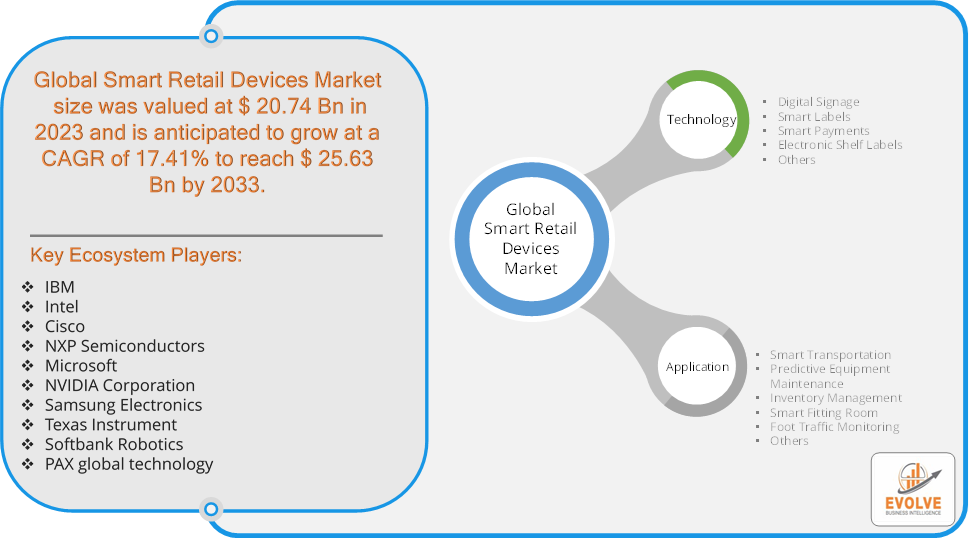Smart Retail Devices Market Surges: 17.41% CAGR

Evolve Business Intelligence has published a research report on the Global Smart Retail Devices Market, 2023–2033. The global Smart Retail Devices Market is projected to exhibit a CAGR of around 17.41% during the forecast period of 2023 to 2033.
Evolve Business Intelligence has recognized the following companies as the key players in the global Smart Retail Devices Market: IBM, Intel, Cisco, NXP Semiconductors, Microsoft, NVIDIA Corporation, Samsung Electronics, Texas Instrument, Softbank Robotics and PAX global technology.
 Read More: https://evolvebi.com/report/smart-retail-devices-market-analysis/
Read More: https://evolvebi.com/report/smart-retail-devices-market-analysis/
Market Highlights
The Global Smart Retail Devices Market is projected to be valued at USD 25.63 Billion by 2033, recording a CAGR of around 17.41% during the forecast period. The Smart Retail Devices Market refers to the market for advanced technological devices used in retail environments to enhance customer experience, improve operational efficiency, and gather data for better decision-making. These devices leverage technologies such as IoT (Internet of Things), AI (Artificial Intelligence), and data analytics to create smart retail ecosystems.
The growth of the Smart Retail Devices Market is driven by the increasing adoption of digital technologies in retail, the need for efficient inventory management, the demand for personalized customer experiences, and the rising competition in the retail sector.
The COVID-19 pandemic had a significant impact on the Smart Retail Devices Market. The pandemic accelerated the adoption of smart retail technologies as retailers sought ways to reduce human contact and maintain social distancing. Devices like contactless payment systems, self-checkout kiosks, and smart shelves became more popular to minimize physical interactions. There was a surge in demand for contactless solutions, including RFID systems, electronic shelf labels, and mobile payment options. These technologies helped retailers to provide safer shopping environments. The pandemic highlighted the importance of efficient supply chain and inventory management. Retailers adopted smart shelves and RFID systems to improve inventory accuracy and ensure the availability of essential goods. Retailers focused on improving operational efficiency to cope with the challenges posed by the pandemic. Smart POS systems and automated inventory management solutions became essential tools for streamlining operations. The pandemic underscored the importance of investing in technology for long-term resilience. Retailers recognized the need to future-proof their businesses by integrating smart retail devices to better handle potential disruptions.
Segmental Analysis
The global Smart Retail Devices Market has been segmented based on Technology and Application.
Based on Technology, the Smart Retail Devices Market is segmented into Digital Signage, Smart Labels, Smart Payments, Electronic Shelf Labels and Others. The Electronic Shelf Labels segment is anticipated to dominate the market.
Based on Application, the global Smart Retail Devices Market has been divided into the Smart Transportation, Predictive Equipment Maintenance, Inventory Management, Smart Fitting Room, Foot Traffic Monitoring and Others. The Inventory Management segment is anticipated to dominate the market.
Read More: https://evolvebi.com/report/smart-retail-devices-market-analysis/
Regional Analysis
The Smart Retail Devices Market is divided into five regions: North America, Europe, Asia-Pacific, South America, and the Middle East, & Africa. North America is a leading adopter of smart retail devices, driven by advanced technological infrastructure, high consumer demand for convenience, and robust retail industry competition. Retailers in North America prioritize omnichannel strategies, integrating online and offline experiences through technologies like smart mirrors, interactive kiosks, and mobile payment solutions. European consumers are tech-savvy, contributing to the rapid adoption of smart retail technologies such as electronic shelf labels, AI-powered analytics, and IoT-enabled devices. There’s a strong emphasis on sustainability and energy efficiency in European markets, driving the adoption of eco-friendly smart retail solutions. Asia-Pacific is experiencing rapid growth in the smart retail devices market due to urbanization, expanding middle-class population, and increasing smartphone penetration. Mobile and digital payment solutions, along with innovative retail technologies, are driving the transformation of retail experiences in markets like China, Japan, and South Korea. Latin America is an emerging market for smart retail devices, with increasing urbanization and rising disposable incomes driving demand for advanced retail technologies. Variability in regulatory frameworks across countries impacts the deployment and integration of smart retail devices, influencing market growth and operational strategies. Urban centers in the Middle East and Africa are adopting smart retail devices to enhance customer experiences, improve operational efficiency, and capitalize on the growing retail sector. Investment in digital infrastructure and smart city initiatives supports the deployment of IoT-enabled devices and digital payment solutions in retail environments.
